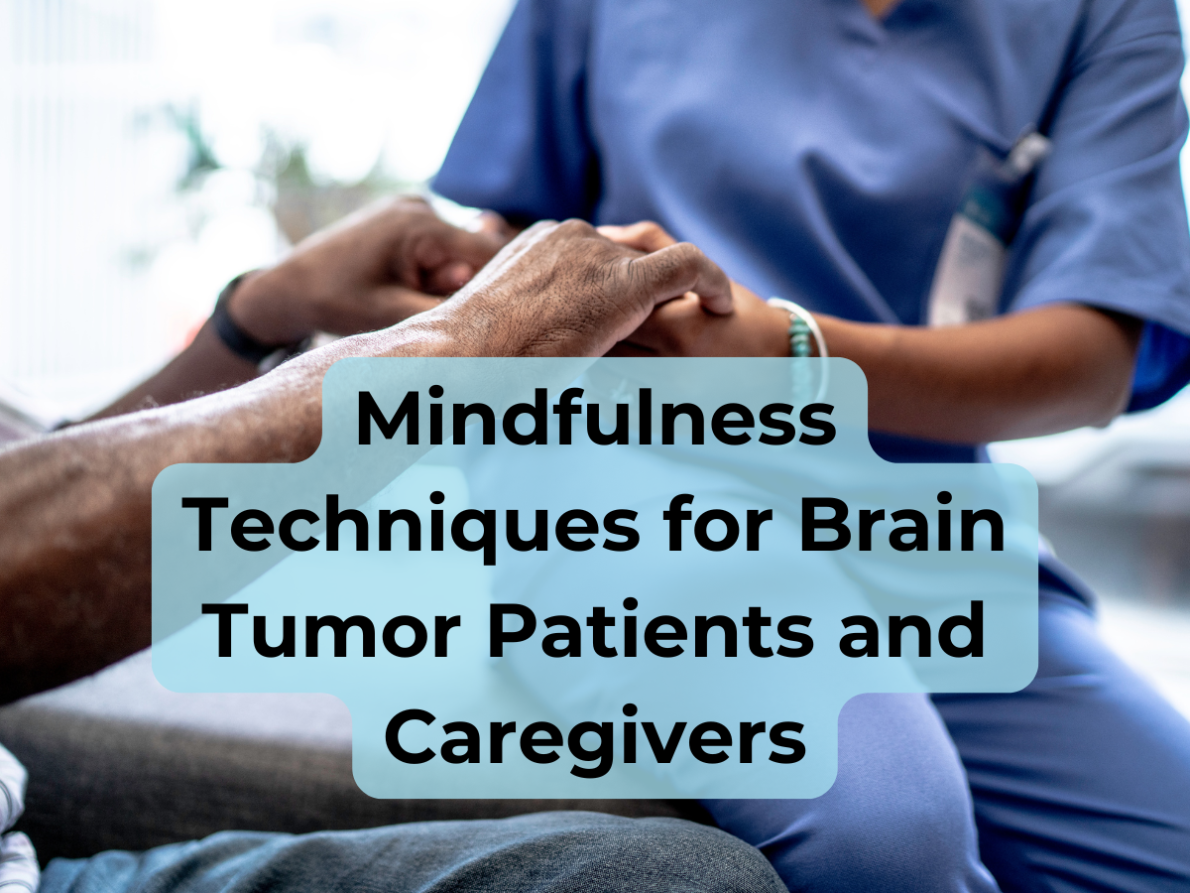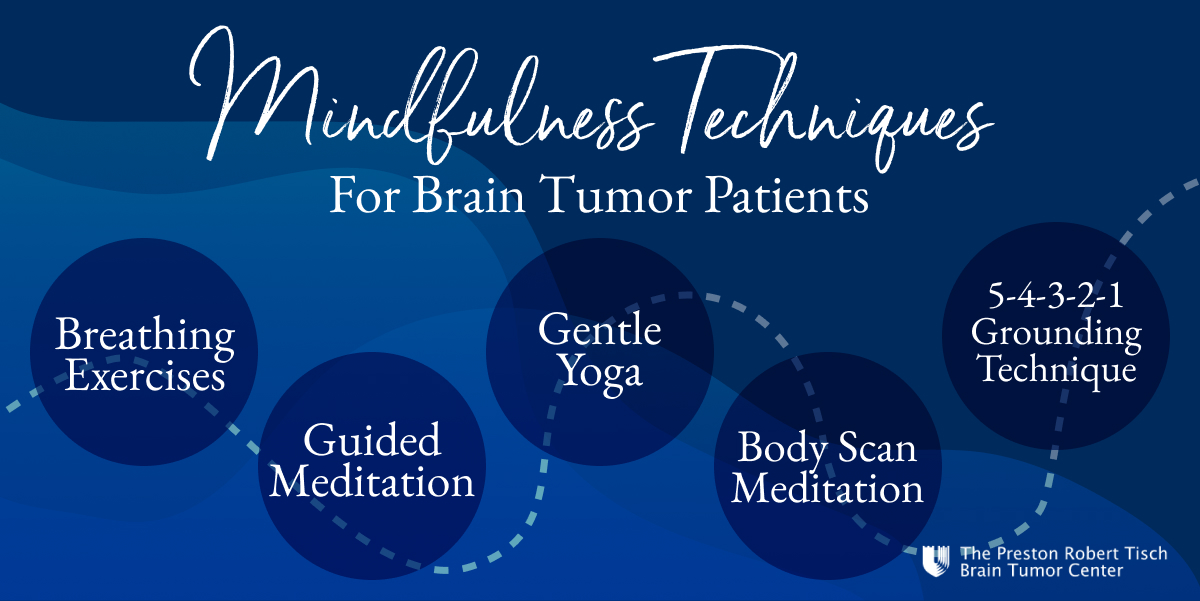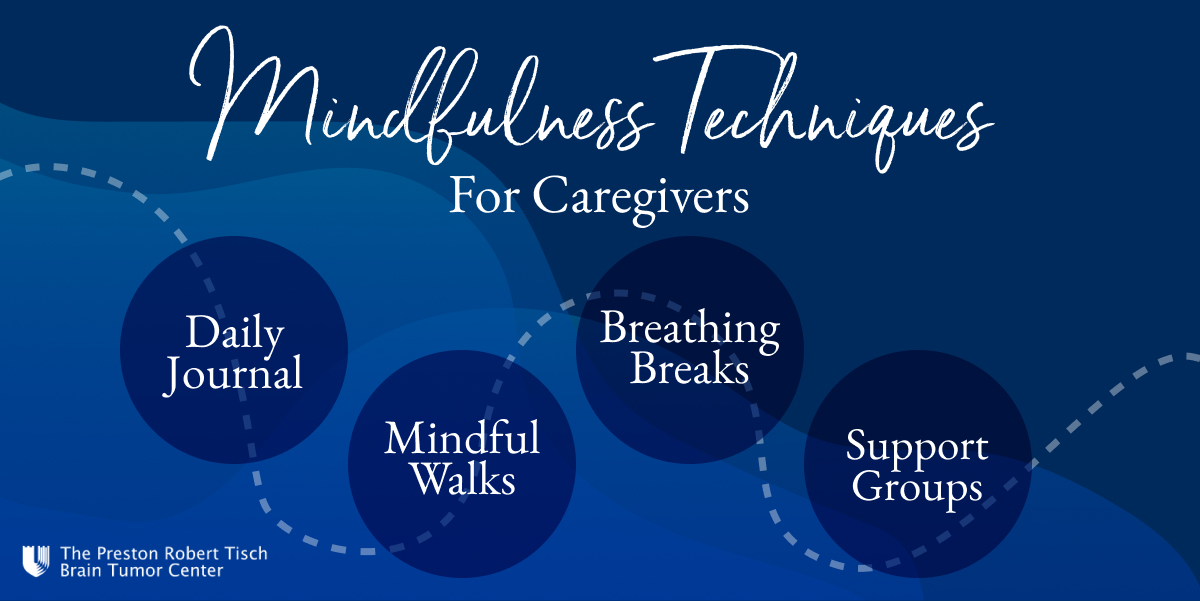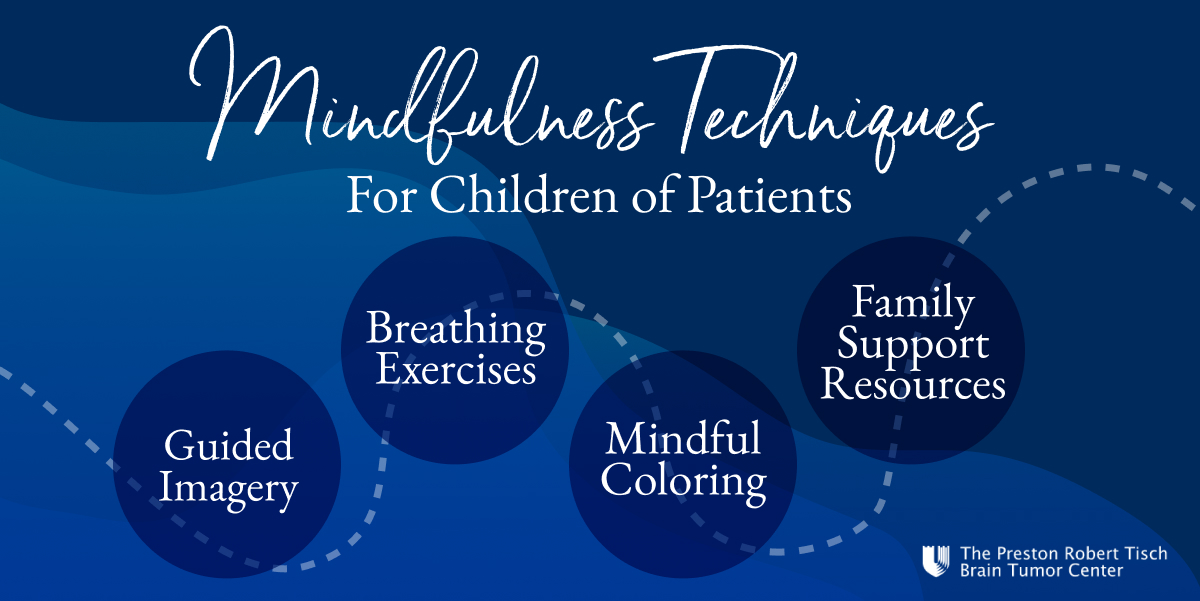Mindfulness Techniques for Brain Tumor Patients and Caregivers

A brain tumor diagnosis changes everything—not just physically, but emotionally and mentally too. Mindfulness practices can make a big difference, helping patients and caregivers handle stress, improve focus, and feel more in control. At Duke’s Preston Robert Tisch Brain Tumor Center, we combine these techniques with top-notch medical care, making sure everyone feels supported every step of the way.
Mindfulness Techniques for Brain Tumor Patients
Mindfulness can help patients stay present and manage overwhelming emotions. These techniques are simple, effective, and easy to incorporate into daily life.
1. Breathing Exercises
Deep breathing is a quick way to calm your mind and body. Try these methods:
- Diaphragmatic Breathing: Place one hand on your chest and the other on your stomach. Breathe deeply through your nose so that the hand on your stomach rises. Exhale slowly through your mouth.
- 4-7-8 Breathing: Inhale through your nose for 4 seconds, hold your breath for 7 seconds, and exhale through your mouth for 8 seconds. Repeat a few times to feel calmer.
These exercises are easy to do anytime you’re feeling stressed.
2. Guided Meditation
Meditation can ease anxiety and improve sleep. Apps like Calm and Insight Timer offer free guided meditations, some designed specifically for cancer patients. Just 10 minutes a day can make a noticeable difference.
3. Yoga for Brain Tumor Patients
Gentle yoga, like restorative or chair yoga, can help relieve tension and boost flexibility. Poses like child’s pose, seated forward bend, or cat-cow stretch are great for relaxation. Check with your doctor before trying new exercises.
4. Body Scan Meditation
A body scan helps you tune into your physical sensations, releasing tension as you go. Start at your head and work down to your toes, noticing each part of your body. Guided body scans are available online and are a good way to relax.
5. The 5-4-3-2-1 Grounding Technique
When you’re feeling anxious, this exercise can help bring you back to the present moment:
- 5 things you see
- 4 things you touch
- 3 things you hear
- 2 things you smell
- 1 thing you taste
This simple practice can calm your mind in just a few minutes.

Mindfulness for Caregivers
Caregivers often carry a heavy emotional load. Mindfulness can help you manage stress and find balance while caring for your loved one.
1. Journaling
Writing down your thoughts and feelings can be a great release. Take a few minutes each day to jot down what you’re grateful for or how you’re feeling.
2. Mindful Walks
Go for a walk and focus on what’s around you—the colors, sounds, and smells. These moments of mindfulness can help clear your mind and reduce stress.
3. Breathing Breaks
Even a short breathing exercise can help. Practice the 4-7-8 technique or simply take three deep breaths to reset.
4. Support Groups
Connecting with others who understand your journey can be incredibly healing. Duke offers caregiver support groups through our Adult Neuro-Oncology Program.

Mindfulness for Children of Patients
Children need support, too, and mindfulness can help them feel more secure.
1. Guided Imagery
Ask kids to imagine a peaceful place, like a beach or a sunny meadow. These visualizations can help reduce anxiety and create a sense of safety.
2. Breathing Exercises for Kids
Make it fun: Ask them to pretend they’re blowing up a big balloon or smelling a flower and blowing out a candle. These exercises are simple and effective.
3. Mindful Coloring
Give them coloring books and encourage them to focus on the colors and patterns. This can be a calming activity during stressful times.
4. Family Support Resources
At Duke, we’re here for families. Learn more about our Pediatric Neuro-Oncology Program for resources tailored to children and families.

Why Choose Duke’s Preston Robert Tisch Brain Tumor Center?
At Duke, we don’t just treat tumors; we treat people. Our team of doctors—a group of over 250 neuro-oncology experts—provides personalized care that addresses both physical and emotional needs. Learn more about our research initiatives and read inspiring patient stories.
Discover Comprehensive Care at Duke
Facing a brain tumor can feel overwhelming, but you don’t have to go through it alone. At Duke’s Preston Robert Tisch Brain Tumor Center, we’re here to help.
Schedule an appointment to learn how we can support you and your loved ones. Our integrated approach keeps every aspect of your care tailored to your needs.
Explore our blog to learn more:
- The Impact of Brain Tumors on Mental Health
- How Does Brain Cancer Affect Everyday Life?
- How to Care for Someone with Brain Cancer
FAQ: Mindfulness and Cancer Care
What exercises are good for brain tumor patients?
Gentle exercises like restorative yoga, guided breathing, and meditation can help. Always check with your care team before trying new activities.
How do you comfort someone with a brain tumor?
Be present and listen. Offer help with daily tasks and encourage mindfulness practices like breathing exercises. Simple, thoughtful actions can make a big difference.
What are mindfulness activities for cancer patients?
Mindfulness activities include guided meditations, body scans, yoga, journaling, and breathing exercises. These practices can reduce stress and improve focus.
What is a mindfulness activity example?
The 5-4-3-2-1 Grounding Technique uses your senses to stay present. It’s simple, quick, and effective for managing anxiety.
What should brain tumor patients avoid?
Avoid activities that might strain your body or mind without consulting your care team. Emotional stress, poor sleep, and unhealthy diets can also impact recovery. Work with your team to create a wellness plan.